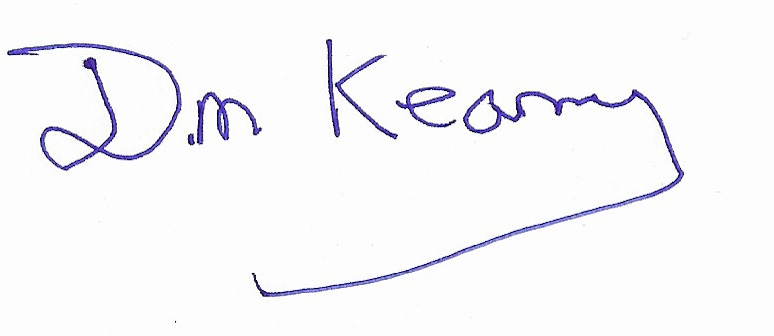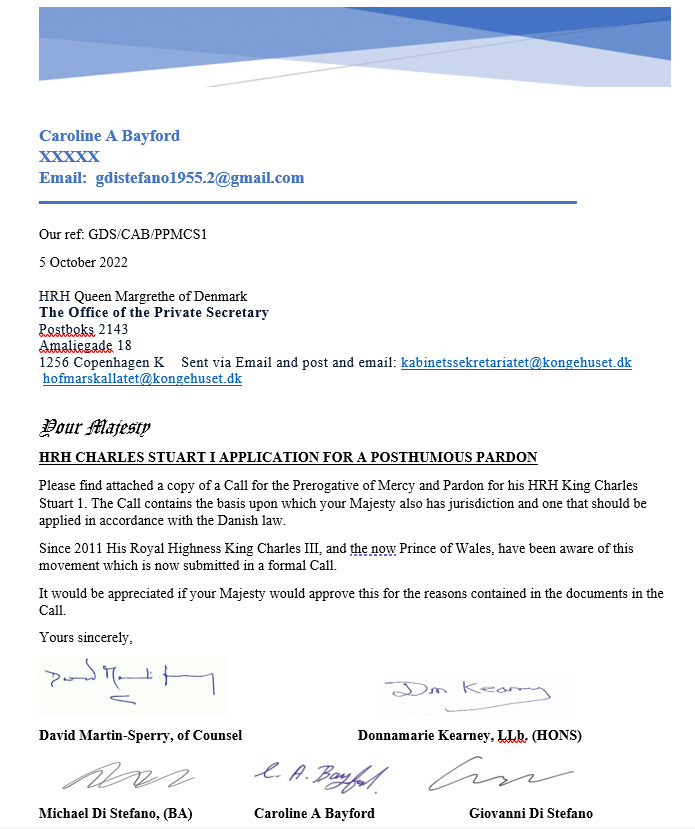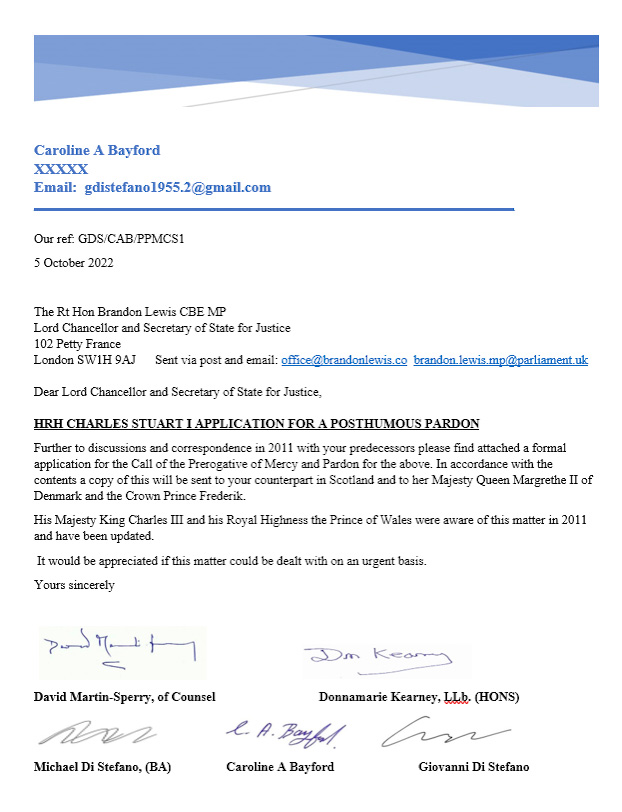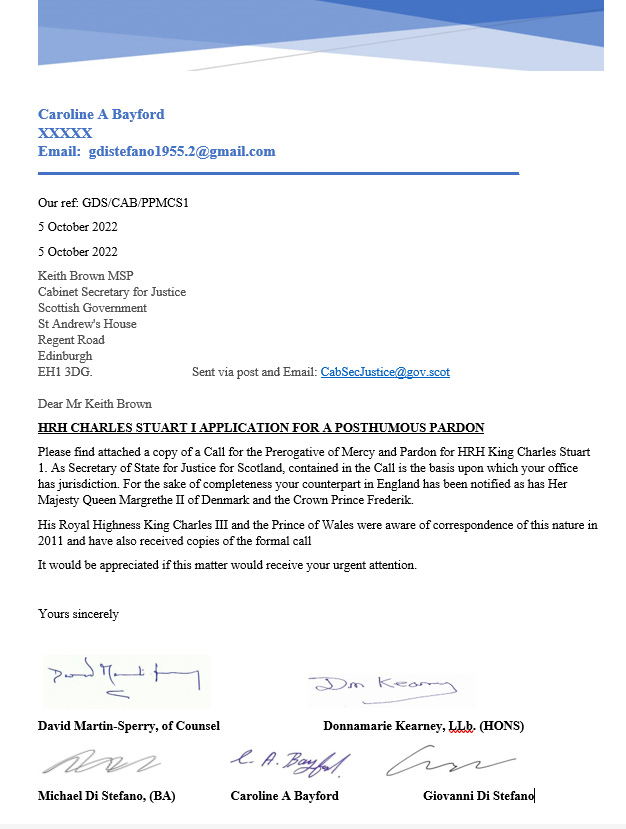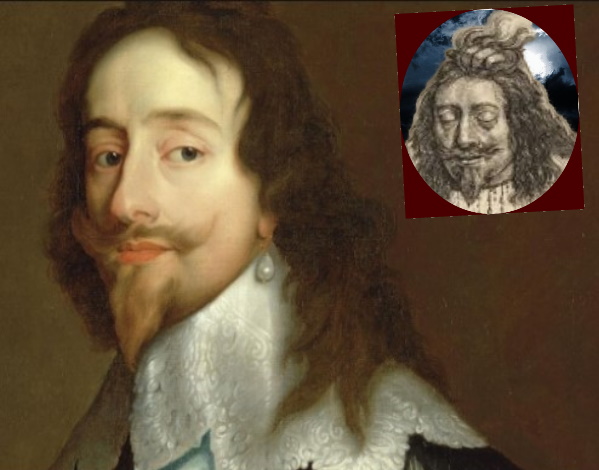
Further to our article published on the 16 September 2022 Legitimate push to pardon Charles I should now be a priority for the government. OPC Global News and Media publish the Call for the posthumous pardon of HRH King Charles Stuart I that has been sent to Queen Margrethe of Denmark, Crown Prince Frederik of Denmark, Brandon Lewis MP, and Keith Brown Justice Minister for Scotland.
Giovanni Di Stefano, now widely referred to as ‘the Devil’s Advocate’, David Martin-Sperry, a reputable and established criminal barrister, Donnamarie Kearney, a law graduate from Scotland, Michael Di Stefano a graduate in History and Politics, and Caroline Bayford, a history and genealogy researcher, have together presented a Call for the posthumous pardon of HRH King Charles Stuart I. This Call is made to the Secretary of State for Justice in England and Wales, to the Secretary of State for Justice in Scotland, and additionally to Her Majesty Queen Margrethe and to Crown Prince Frederik of Denmark, Anne of Denmark having been the mother of Charles I.
This group of five has been working towards this end since 2011, with the knowledge and with no objections from Buckingham Palace. David Martin-Sperry, an eminent barrister practicing for over 50 years and specialising in miscarriage of justice cases said: “The whole point in this case is that at all material times Charles Stuart was the recognised and accepted King of England. Acts of Parliament in force at the time of the trial and even the death warrant itself so describe him.” Giovanni Di Stefano added, “As a consequence of this, the doctrine of Sovereign Immunity kicks in.”
This Call for a posthumous pardon is based on the proposition that the Sovereign is quite simply immune from any sanction of the criminal law – which at the time included the death penalty. By way of example, Giovanni Di Stefano added “Recognising this, King Henry II allowed himself to be publicly flogged for his participation in the killing of Archbishop Thomas à Becket by four of his knights in 1170. That was him punishing himself, as only he had the right to do.”
Donnamarie Kearney has advised that Scotland has jurisdiction because Charles I was born in what was then an independent country. The Act of Union did not come into force until over 50 years later.
For her part, Caroline Bayford produces a family tree tracing the bloodline of the now Prince of Wales and of Prince Harry back to King Charles Stuart II, the son of Charles Stuart I through their mother Lady Diana Spencer.
Michael Di Stefano now encapsulates the case in this way: “It is necessary to clean the lineage, especially since Charles Stuart I suffered a grave miscarriage of justice.”
This group of five today seek to rectify the miscarriage of justice that occurred hundreds of years ago. David Martin-Sperry added that a copy of the Call for a posthumous pardon was being sent to his Majesty King Charles III and to the Prince of Wales.”
A decision is expected in due course.
- The Call for the Prerogative of Mercy and Pardon is exercised by the Sovereign on the advice of the Secretary of State in one of three ways:
- The grant of a free, unconditional Pardon.
- The grant of a conditional Pardon, whereby the penalty is removed, on the condition that a lesser sentence is served.
- The remission, or partial remission, of the sentence.
- The Criminal Law Act 1967, s.9 states that a Pardon granted under the sign manual, countersigned by the Secretary of State “Shall be of like effect as a Pardon under the Great seal.”
- This Call for the Royal Prerogative of Mercy and Pardon relates to:
- The grant of a free, unconditional Pardon.
- The Royal Prerogative is a flexible power, and its exercise can and should be adapted to meet the circumstances of the particular case. [see R v Secretary of State for the Home Department, ex P. Bentley (1994) 2 W.L.R. 101 at 113.]
- The grant of the Royal Prerogative of Mercy and Pardon remains unaffected by the Criminal Appeal Act 1968. [see s.49 Criminal Appeal Act 1968: “nothing in this Act is to be taken as affecting her/his Majesty’s Prerogative of Mercy.”]
- The Call for a free Pardon is established as a remedy for wrongful convictions without the necessity of a formal application to the Courts. [see ex P. Bentley, n.2 at 107 where the example is the case of the posthumous Pardon for Timothy Evans was given. See also Burt v Governor-General (1989) 3 N.Z.L.R. 64 (1992) 3 N.Z.L.R. 672 (quoted in Ex P. Bentley at 110) where it was said that the Prerogative of Mercy had become an integral element in the Criminal Justice System, a constitutional safeguard against mistakes.]
- The policy of what was the Home Office (now the Ministry of Justice) is that:
“The Free Pardon, as an exceptional Act of Grace, should be confined as far as possible to those who are morally, as well as technically innocent. This ‘clean hands’ doctrine does imply that the Secretary of State must be satisfied before recommending a Free Pardon, that in the incident in question the defendant had no intention of committing an offence and did not, in fact, commit one.” [Miscarriages of Justice, Sixth Report of the Home Affairs Committee House of Commons (1981-82) H.C. 421, Minutes of Evidence, para.3]
- There is no set procedure to be followed by the Secretary of State in considering the exercise of the Prerogative of Mercy and Pardon [De Freitas v Benny (1976) A.C. 239, 247/8]. When considering whether to recommend the Royal Prerogative, the Secretary of State may refer “any matter” that arises to the Criminal Cases Review Commission for it to investigate and report upon: Criminal Appeal Act 1995, s.16 (1).
- The Criminal Cases Review Commission also has the power to refer “any case” to the Secretary of State for him/her to consider recommending the exercise of the Royal Prerogative. [Criminal Appeal Act 1995, s.16 (2)]
- Before a free Pardon is granted the views of the Judiciary are normally sought, although this is generally only a formality. [see Pattenden, English Criminal Appeals p.381]
- HRH King Charles Stuart I was born to James VI of Scotland – later James I of England – and to Anne of Denmark on the 19 November 1600 in Dunfermline Palace, Fife in Scotland. It follows that the United Kingdom of Great Britain and N. Ireland – including what was then the separate country of Scotland – and the Kingdom of Denmark would each individually have locus standi. The Call will therefore also be sent to the Secretary of State for Justice in Scotland, and additionally, in the light of his Danish ancestry, to the Kingdom of Denmark: The Royal Prerogative of Pardon is exercisable by the Sovereign of Denmark under Part III No. 24 of the Constitutional Act of Denmark of June 5th, 1953.
- The basis for the application of the Royal Prerogative of Mercy and Pardon is that the Sovereign is immune from criminal jurisdiction, thus rendering the trial of HRH King Charles Stuart I (held at Westminster Hall and resulting in his execution for High Treason on the 30th of January 1649) a nullity.
- Such immunity does not extend to deposed or exiled Sovereigns apprehended within the jurisdiction. [R v Mary Queen of Scots (1586) 1. St. Tr. 1161]. HRH King Charles Stuart I had been captured by the forces of Oliver Cromwell, but at no stage was he ever deposed or exiled. At all material times those who placed him on trial knew, accepted, and recognised that he was the lawful King. On 6th January 1648 the Act that was passed by Parliament establishing a Special High Court of Justice, purportedly to enable and facilitate the trial stated in terms:
“WHEREAS it is notorious that Charles Stuart, the now King of England ….”
Even the death warrant itself recognised that he was King of England:
“Whereas Charles Steuart Kinge of England…”
- Those that placed HRH King Charles Stuart I on trial knew of binding precedent to be found in the reported case of Mary Queen of Scots: any subsequent trial would have been bound by its findings.
- As a consequence, the conviction and subsequent execution of HRH King Charles Stuart I was a nullity, in circumstances that now require the Royal Prerogative of Mercy and Pardon to be applied.
- It should be said that in accordance with settled practice the law to be applied is the law as it stood when the trial took place. The law at that time was subject to the case of Mary Queen of Scots and to the doctrine of Sovereign immunity
- The Call for the Royal Prerogative of Mercy and Pardon for HRH King Charles Stuart I is now sought and should be applied forthwith.
David Martin-Sperry, of Counsel
Donnamarie Kearney, LLb. (HONS)
Michael Di Stefano, (BA)
C A Bayford
Giovanni Di Stefano
Dated this day 3 October 2022 – Being the date when his Royal Highness King Charles III attended Dunfermline Palace being the birthplace of King Charles I.



